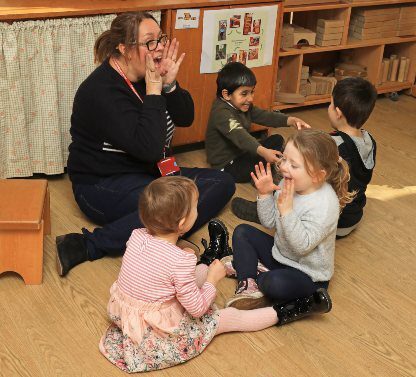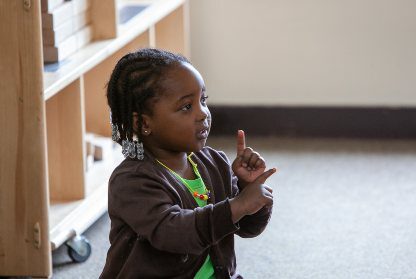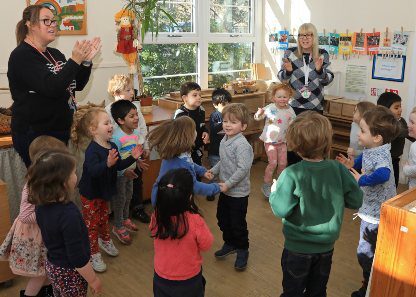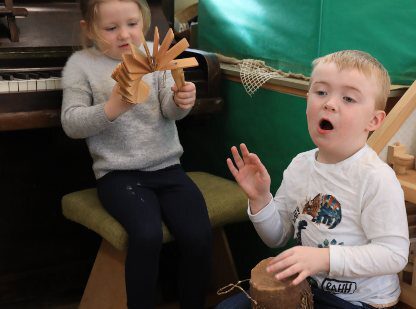Leading up to the 2022 Froebel Trust autumn lecture all about the power of creativity, a new article by Rachna Joshi reflects on the importance of songs, music and dance in Froebelian early childhood education today.
Singing is at the heart of early childhood, well it should be…
Since COVID-19 there have been restrictions on singing in settings. Music, songs and dance have been forgotten and lost behind the narrative of ‘catch up’ programmes, reading, writing and maths.
In this article, I hope to (re)introduce practitioners to Froebel’s Mother Songs (Family Songs) and their value; and reinvigorate you with a deeper understanding of why singing is so vital in early childhood.
Songs are all around us! We are musical and communicative beings who are naturally drawn to songs. If you are an avid social media user, you may notice TikTok songs are often stuck in your head, or adverts from the television can replay in your mind. Why do we scroll through the radio in the car to find the perfect song for our drive? Or our obsession with perfecting our music playlists for that special moment or event. Our brains naturally seem to remember music and often we ‘can’t get it out of our head’.
Songs and music are emotional, they can call out our worries, soothe us and help us drift off to sleep, they can raise our heart rates and pump up our adrenaline. They have the gift of transportation and time travel, they can build emotions, give a sense of belonging and develop power and importantly, they create connections and community.
Come to the Froebel Trust Autumn Lecture
Thursday 10 Nov at 7pm. Online. With guest speakers - award winning dancers Anthony & Kel Matsena
Get your free ticketSongs and music give a sense of belonging... and create connections and community.

Froebel Mother Songs
Froebel created 50 finger rhymes, action songs and games for families to share with babies and young children and their communities. Songs were created to illustrate Froebelian forms: everyday life, beauty and knowledge. These were carefully considered songs that supported key learning experiences (Tovey 2016).
‘Pat a Cake’ is an example of a Froebel song where the baking of bread would be part of everyday life in his time – this is also true now for those pandemic sourdough bakers! He describes the beauty and magic of the baking process and transformation of dough through rising and heating. He illustrates the knowledge that the baker shares with the child and their participation in the process. A seemingly simple song has such depth and meaningful notions that once a practitioner is aware of this, it can be shared with the same depth and meaning with children. (Froebel, 1895 [transl. Blow])
Singing is about relationships, and nurturing relationships is a fundamental Froebelian principle.
Froebelian Principles and Songs
The Froebelian principles that stand out in relation to Mother Songs are:
• creativity and the power of symbols
• the importance of relationships
• unity and connectedness.
These Froebelian principles may not outline explicitly his value in songs, however implicitly we find many connections between the power of songs and music in early childhood.
The principle of creativity and the power of symbols has the closest affinity in demonstrating his value placed in music. Froebel deeply valued creative activity and linked this to ‘high meaning’ and, through the child’s work, we ‘represent the inner in the outer; that we give body to spirit and form to thought’ (Froebel, 1885). The images in our mind are materialised in creative endeavours.

The finger movements that Froebel details in ‘Mother Songs’ represent something else from the world around the child; for example, in the song ‘The Little Window’ the hands are held together with straight fingers to allow a little light through and the beauty in the light is celebrated throughout the rhyme.
We can also think about the songs that are sung in settings now and how these represent the natural world, such as the bees in the song ‘In the beehive’. We should consider the worthwhileness of the current songs we know, particularly through the Froebelian lens.
Singing is about relationships, and nurturing relationships is a fundamental Froebelian principle.
In Froebel’s song ‘Bend your Head, Thumb!’ he calls each finger to greet each other and reminds us how good friends behave when they are meeting, establishing social knowledge for young children through song and finger rhyme. This reminds me of favourite action songs, like ‘Tommy Thumb’ that is often sung in many settings.
At the time of Froebel’s writing, it was usual for mothers to care for babies and young children. His songs provided opportunities for connectedness between baby and mother as well as with other people in their communities. He observed how children would move and react to mothers singing. Contemporary research has confirmed how singing can support the connection and interaction between mother and baby and demonstrated the baby's intentional movements in response to singing (Trevarthen & Aitken, 2001).
For our youngest babies, songs are vital to attachment and self-esteem. Further contemporary research shows lullabies create rhythms similar to a heartbeat, which promotes cohesive family growth and comfort for both baby and mother (Corrigan et al., 2021).
Re-establishing songs and movement can only bring out joy, love and laughter in our settings.
Finally, Froebel's principle of unity and connectedness weaves its way through Mother Songs. Froebel introduced songs with the whole body and limbs, then the whole hand, followed by separate use of fingers, giving attention to the whole and then the parts (Bruce, 2021). Froebel placed importance in community and describes how songs and rhymes have ‘attracted a troop of other children’ - a notion that also brings about the feeling of belonging, which is what happens when we feel connected (Froebel, 1895 [transl. Blow]).
Froebel prioritised valuable interactions and connections, ensuring that he made clear the Mother Songs were not a prescriptive curriculum. Instead, they offered opportunities to share in delight and laughter together. Therefore, reminding practitioners today, that those songs and rhymes that spontaneously ‘pop’ into our head are just as important as the ones planned for each week or term.
This may urge leaders to ensure that staff have a repertoire of carefully considered songs and action rhymes. We have to examine and compile a relevant collection for today by taking Froebel’s considerations of family, community and occupations as important aspects, ensuring that songs are related to and represent children’s everyday life.

How do we choose a song rooted in Froebelian principles?
• Does the song connect to a part of children’s family, everyday life and community?
• Does the song offer inspiration or share delight in the beauty of the world?
• Does the song explore and share knowledge of the world around us?
• Are we considering songs in different languages and from varied cultures?
Froebel championed songs and movement in early childhood and this is apparent through his extensive and detailed work on Mother Songs. Bringing awareness of the symbolism in songs can ensure practitioners are considering these musical moments as valuable interactions with children. Re-establishing songs and movement can only bring out joy, love and laughter in our settings.
Further reading - links and references
Tovey, H. (2016). Bringing the Froebel Approach to Your Early Years Practice. Abingdon: Taylor & Francis.
Fröbel, F., [translated by Blow, S. E.] (1895). The Songs and Music of Friedrich Froebel's Mother Play (Mutter und Kose Lieder). United States: D. Appleton.
Froebel, F. (1885). The Education of Man. United States: A. Lovell & Company.
Bruce, T. (2021). Friedrich Froebel: A Critical Introduction to Key Themes and Debates. London: Bloomsbury Academic.
Trevarthen, C., & Aitken, K. J. (2001). 'Infant intersubjectivity: Research, theory, and clinical applications' in Journal of Child Psychology and Psychiatry, 42(1), p. 3–48. doi.org/10.1111/1469-7610.00701
Corrigan M., Keeler J., Miller H., Naylor C. & Diaz A. (2022) 'Music Therapy and Family-Integrated Care in the NICU: Using Heartbeat-Music Interventions to Promote Mother-Infant Bonding' in Advances in Neonatal Care: Official Journal of the National Association of Neonatal Nurses. Oct.22(5), p.159-E168. DOI: 10.1097/anc.0000000000000910.
About the author
Rachna Joshi will be taking part in the Froebel Trust's autumn lecture on 10 November 2022. She created this short article, about her experiences of working with children and families and bringing music into early years settings, during the Froebel Trust's Writing Workshop held in Summer 2022.
Rachna is an early childhood teacher, action-researcher and consultant. She works with under-threes, Nursery and Reception children in classroom settings, and holds an MA in Early Childhood Studies. She writes for organisations like Tapestry and Early Education, sharing knowledge, empowering practitioners and provoking questions to disrupt routine practice.
A passionate advocate for rough and tumble, anti-racist practice and identity, self-awareness and metacognition in young children, Rachna combines theory and practice to promote the holistic development of the children she works with and their communities. Rachna's recent work includes embedding music into settings via grants to purchase outdoor music walls, open-ended music resources and workshops for children and their families.


